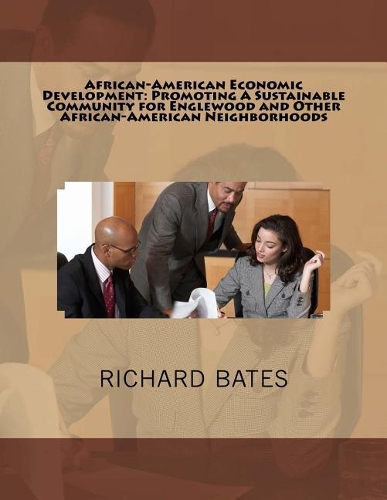
African-American Economic Development: Promoting a Sustainable Community for Englewood and Other African-American Neighborhoods
Series:
Added Information: 12/15/18The information presented in this research demonstrates that Englewood like too many similar African-American communities in America, has lost its ability to be economically, politically, and otherwise self-sufficient/autonomous over the years as their neighborhoods have economically deteriorated. This was due to a serious demise of businesses, middle/upper class residen
NaN
VOLUME
English
Paperback

Added Information: 12/15/18The information presented in this research demonstrates that Englewood like too many similar African-American communities in America, has lost its ability to be economically, politically, and otherwise self-sufficient/autonomous over the years as their neighborhoods have economically deteriorated. This was due to a serious demise of businesses, middle/upper class residents, crime, gangs, drugs, poor policing, poor educational institutions, and a server loss of population in general. All of these factors have contributed to an extensive loss of revenue in these areas. This has resulted in the residents in neighborhoods similar to Englewood becoming passive participants in the essential functions of the space/location they live in. Consequently, they usually have little if any authentic or substantive control/participation within the major spheres of influence and power in this these areas. Important decisions are mainly controlled by outsiders who rarely act in the residents true economic-political-social interest. This research suggests that this situation can possibly be resolved over a period of time by implementing various proposals and models for economic, political empowerment/sustainability presented in this writing that have been successful or had some significant measure of achievement such as the Mondragon Corporation's Workers Cooperative of Basque Spain, the Black owned First Independence Bank in Detroit, Michigan, or the various Black Cooperative current day and from the past that are detailed in such literature as Collective Courage A History of African American Cooperative Economic Thought and Practice by Jessica Gordon Nembhard, which were promoted by the renowned African-American scholar Dr. W.E.B. DuBois. Although this information is primarily focused on Englewood the suggestions put forth should be useful for other Black or non-Black communities confronted with similar circumstances. Also other crucial themes directly and indirectly related to the issues that I have researched in this book are discussed.About the Author: Richard Bates has an academic background in Political Science from the University of Michigan, Inner City Studies from Northeastern Illinois University, and History and Community Development from Chicago State University with graduate level degrees from Northeastern Illinois University, and Chicago State University. Mr. Bates has had academic motivation from courses and one on one discussions with such scholars as veteran activist, journalist, MT contributing editor/ African-American-Studies instructor and author Herb Boyd. Mr. Boyd has appeared in the documentary, Eyes on the Prize, and has presented book reviews of his numerous writings on C-Span Book TV, such as African History for Beginners, For Beginners, Baldwin's Harlem, Brotherman: The Odyssey of Black Men in America, We Shall Overcome: The History of the Civil Rights Movement as It Happened, and Black Detroit: A People's History of Self-Determination. University of Michigan History Professor Harold Cruse, the author of Crisis of the Negro Intellectual, and Plural But Equal: A Critical Study of Blacks and Minorities and America's Plural Society. University of Michigan African-American Studies instructor Rovan Locke, CEO & Publisher Caribbean-American Commentary Newspaper. Professor Robert Starks instructor at Northeastern Illinois University/Political-Science.Starks served as an issues advisor to Reverend Jesse L. Jackson and political advisor to the late Chicago Mayor, Harold Washington. Professor Starks has appeared on Chicago radio station WVON 's 'On Target Show" and on ABC-TV's Nightline, the Today Show, and CNN. Another scholar who has influenced Mr. Bates is Chicago State University instructor Dr. Daniel Block, of the Department of Geography - Community Development Program and Neighborhood Assistance Center. Richard has a history of activism since High School/College and participation in electoral campaigns, for local, state and national elected officials. Mr. Bates frequently attends local gatherings where important community issues are discussed. To help stay informed Mr. Bates regularly attends and participates in lectures at local Universities, Community Forums, the DuSable Museum, The Harold Washington Cultural Center, and various Churches over the years in Chicago where he currently resides. He supports and always encourages others to support the various entities and businesses that help contribute to the enhancement and empowerment of their neighborhood, city, state, and nation.
Price Comparison [India]
In This Series
Bestseller Manga
Trending NEWS




















